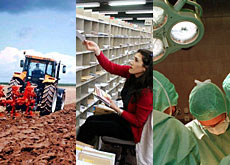Swiss economy challenged by EU enlargement

The Swiss economy, which has been stagnating for the past decade, is now preparing for the challenge of competing with a 25-member European Union.
While export-led sectors stand to gain from EU enlargement, the domestic market needs reforming if Switzerland is to experience a return to economic growth.
Growth will depend on a clampdown on cartel agreements, improved transparency and more help being offered to business start-ups – all issues which the Swiss government has been grappling with for some time.
As ten countries – mainly from central and eastern Europe – prepare to join the EU, Switzerland appears increasingly isolated at the heart of a continent where economic integration is proceeding apace.
But the prospect of EU expansion does not seem to be worrying Swiss business leaders, many of whom view enlargement as a chance to break into new markets.
Incentive
“EU enlargement is in fact the best incentive we have to develop trade and position our enterprises in emerging markets,” said Catherine Lance of the Swiss Business Federation, economiesuisse.
Companies have had the opportunity to expand into central and eastern Europe since the fall of the Berlin Wall, but investment in former eastern bloc countries has often been considered to be a risky business.
Foreign investors have encountered problems such as unpaid bills, failure to meet delivery deadlines and a lack of legal protection.
But the fact that these countries are being accepted into the EU fold suggests that their trading practices are now in line with those of existing member states.
For Swiss businesses, the main change is reduced bureaucracy.
“The ten different national systems which exist at present will in future be harmonised with those of the other union members,” said Lance. “That will be a great help to businesses wanting to expand into these new countries.”
Furthermore, economic and business relations between Switzerland and the new member states will be governed by the free trade agreement concluded with the EU in 1972 and the seven bilateral accords, which should provide investors with some security.
“By joining the EU, these countries are making it clear that they will apply the same law in the same way as the other member states, which should mean that investments will be more likely to reap dividends,” said René Schwok, professor at Geneva University’s Graduate Institute of European Studies.
Growth potential
A study carried out by the Credit Suisse Group in 2003 into the impact of EU enlargement on Switzerland found that the new member states accounted for 2.5 per cent of Switzerland’s foreign trade.
Poland, Hungary and the Czech Republic together accounted for just one per cent of Swiss direct foreign investment.
These figures reveal clear potential for growth, but Switzerland will face tough competition from other EU members.
The Credit Suisse report found that Switzerland’s chemical, machine and electronic industries were likely to benefit most from EU enlargement.
Schwok believes opportunities will also exist for the financial sector.
“Banking, insurance, reinsurance and trading are all sectors in which Switzerland can excel,” he said.
Analysts believe that while EU enlargement is unlikely to lead to a huge boom in Swiss exports, certain sectors will benefit from modest export growth.
swissinfo, Jean-Didier Revoin
On May 1, ten countries – Estonia, Latvia, Lithuania, Hungary, Poland, the Czech Republic, Slovakia, Slovenia, Cyprus and Malta – will join the EU.
Economic and trade relations between these countries and Switzerland will henceforth be governed by the 1972 free trade accord and the seven bilateral accords.
The new EU member states currently account for just 2.5% of Switzerland’s external trade.
The economic branches most likely to benefit from EU enlargement are the chemical, machine and electronic industries, as well as the financial sector.

In compliance with the JTI standards
More: SWI swissinfo.ch certified by the Journalism Trust Initiative

You can find an overview of ongoing debates with our journalists here. Please join us!
If you want to start a conversation about a topic raised in this article or want to report factual errors, email us at english@swissinfo.ch.